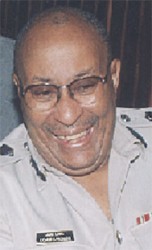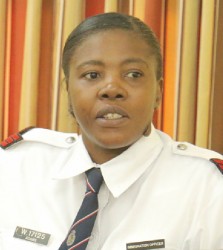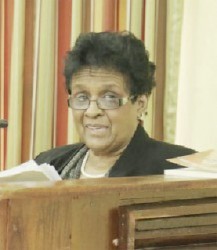Former Commissioner of Police Laurie Lewis paved the way for Gregory Smith, the key suspect in the 1980 killing of Dr Walter Rodney to obtain a Guyana passport in 1999, the inquiry probing his death heard yesterday.
The testimony by an immigration officer before the Rodney Commission of Inquiry may yet be the most important revelation in the almost year-old hearings and could tie the deceased Lewis, a former senior intelligence figure in the PNC administration, with a conspiracy to spirit Smith out of the country after Rodney’s killing.

Along with the then ruling PNC, Smith, a former Guyana Defence Force (GDF) member, has long been accused of causing the death of the Working People’s Alliance (WPA) founder, who perished on June 13, 1980 after a walkie-talkie given to him exploded. Smith has been identified as the man who gave Rodney the device and he was later whisked to Cayenne, French Guiana under a different name where he lived until December 2002, when he died of cancer.
Police Sergeant Alexis Adams, an Immigration Officer attached to Records Department, of the Central Immigration and Passport Office, yesterday testified that records indicate usual procedures that must be followed for the issuing of a passport were not followed in the case of Smith.
Sergeant Adams, in her evidence-in-chief, said that after receiving instructions from the Deputy Chief Immigration Officer, she successfully went through records, in search of passport application forms in favour of William “Gregory” Smith, whose date of birth was given as June 5, 1946.
She said she was also required to look for an application form with the name Cyril Milton Johnson, which she also found. His birth date was given as June 5, 1943.
Adams said that her efforts to locate “an” application form #268685 of 1980, which she was also instructed to do, however, proved fruitless.
After being given a chance to examine the form in favour of Smith, which was tendered into evidence along with the other, counsel for the commission Glenn Hanoman asked the witness whether she had seen the letters “CoP,” indicating from whom the form was being sent to the passport office for the application to be processed.
She answered, “Yes.”

Hanoman then asked the witness to explain what the letters on the form meant, to which she responded that its record on the form was an acronym for “Commissioner of Police.”
Upon Hanoman’s inquiry, Adams then disclosed that recorded at those letters was the name Laurie Lewis, which indicated who was the commissioner of police from whom the application was sent.
Asked whether she had seen from the document that there was no signature where the applicant, “Smith,” should have signed and that there was no guarantor recorded on the form, the witness again answered in the affirmative.
Hanoman then enquired from the witness whether such omissions defied passport application procedures, to which she again answered in the affirmative.
The woman explained that once procedures are followed, a passport is not supposed to be issued in such circumstances.
Adams was, however, able to confirm, after examining the application form, that the passport was nonetheless issued because of the presence of a number of features, which she explained were peculiar to the application having been granted.
She noted that a diagonal line was drawn through the application form and that there was a special stamp/seal which indicated that the travel document had been issued to the applicant.

When asked, the immigration officer said that the “Commissioner of Police” is the “Chief Immigration Officer” and that forms passing through him “have to be expedited.”
Asked by Hanoman whether it was possible that the reason the passport was issued to Smith, even though procedures were not followed, was because the application was coming from the Commissioner of Police, the witness answered in the affirmative.
At the time of Rodney’s death, Lewis was a senior figure in the Police Special Branch, the then intelligence apparatus of the PNC government. He rose through various positions to become Police Commissioner in August 1990 and serving through 2001, most of this while the PPP/C was in office. When the passport would have been provided to the Cayenne-based Smith in 1999, there would have already have been discussions here by the government and the WPA to have Smith face murder charges and for him to be extradited.
It was only very recently that counsel for the commission became aware of the 1999 passport.
Attorney for the PNCR Basil Williams was absent at the time Adams testified.
‘The greatest hoax’
Williams was, however, present earlier when he continued the cross-examination of Smith’s sister, Anne Wagner, who agreed with a suggestion from counsel that the PNC being held responsible for Dr Rodney’s death was a hoax.
“What I would say is, it’s the greatest hoax in the history of this country,” Williams opined before Wagner added, “I would say so too.”
Quizzed on parts of the book-Assassination Cry of a Failed Revolution: The Truth About Dr Walter Rodney’s Death—which she said she co-authored with her brother Smith, Wagner also agreed with suggestions from Williams that the WPA had former President Forbes Burnham, under “deep surveillance” and would not have been disappointed if he died.
Williams read an extract, which Wagner said her brother had related to her, from a conversation he had with Dr Rodney and which is recorded on page 24 of the book:
“President Burnham fleeing by boat in the night, would expose himself to the risk of a serious accident. He would rather take the risk of having a serious accident by boat, than to allow us (the WPA) to capture him. However, he said, it would be too bad if he should die while trying to escape.”
She agreed, when asked, that she understood from that extract as well that the WPA was trying to physically capture Burnham in addition to wanting him dead.
Another extract which was read stated, “Dr Rodney said he would prefer to humiliate President Burnham with the use of the judicial system and convicting President Burnham for his crimes would end his political career.”
The extract went onto page 25.
“Dr Rodney had mentioned several crimes that President Burnham had committed and some were done through his instructions. The crimes that Dr Rodney had mentioned were murder, torture, sexual harassment of women in his employment, and the conversion of public funds to his personal use,” it read.
Wagner was then asked by Williams if her brother had told her that Mr. Burnham was ever charged with murder, torture or sexual harassment, to which she responded in the negative.
When asked, she told Williams that while she did not know, she guessed that the things which Dr Rodney had told her brother were a figment of his (Dr Rodney’s) imagination.
‘Perpetual victim’
Responding to questions from Hanoman and Chairman of the Commission Sir Richard Cheltenham, Wagner said she believed that her brother became a “perpetual victim,” after Dr Rodney’s death.
After showing other passports and applications that the woman admitted she did not know her brother had, Sir Richard then enquired from Wagner if it was not true that she thought her brother had told her everything.
The woman initially answered yes, but then went on to explain that she understood her brother’s circumstances in him being forced by the WPA to leave Guyana, since the party began blaming him for Rodney’s death.
She said also that her brother had told her that he had been given falsified documents on which to travel out of Guyana.
The woman ended her testimony yesterday, after four days of being on the stand.
Sir Richard announced that yesterday marked the sixty-sixth day of the public hearings, which have now been adjourned until further notice.
The inquiry is being heard at the Supreme Court Law Library.





